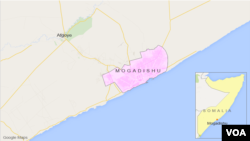The families of nine Somali workers shot dead while working on a bush clearance project funded by the United Nations are calling for a full and a transparent investigation into the incident.
The families say their relatives were instructed to carry out semi-military activities without proper security protection. Guards recruited to give them protection were on a breakfast break at the time of attack. The victims have received death threats according to documents seen by VOA Somali. According to the coordinator of the workers, the threats were coming from people claiming to be al-Shabab militants.
“We did not get justice,” says Jama, the son of one of the workers killed. “We need a thorough investigation and accountability.”
The incident occurred on February 25, 2019, when gunmen believed to be al-Shabab militants attacked the workers as they cleared the bush from the sides of the Mogadishu-Afgoye corridor.
Al-Shabab uses the bushes to hide improvised explosive devices. Cutting the bush was specifically intended to remove trees to deny Al-Shabab the opportunity to plant IEDs.
The multimillion-dollar project was funded by the United Nations Mine Action Services (UNMAS), which subcontracted a Ukrainian company, Ukroboronservice (UOS) to carry out the work. The families say the project was risky, and they allege negligence on the part of the United Nations and the Ukrainian company.
Families say the incident was kept under wraps until a VOA report aired the grievances of the victims’ relatives in July 2020.
The U.N. now says it has conducted a review of the incident and held discussions with the contractor. The contactor completed providing “financial aid” to the families of those killed and those injured in the attack, the U.N. told VOA Somali.
On June 5 this year, UOS officers met with the victims and their families in the office of the district commissioner in Afgoye, UNSOM spokesperson Ari Gaitanis told VOA Somali.
“They also explained the process of payment of the financial compensation, the amount that was to be paid to those injured and to the families of the deceased, as well as the documentation that would be required from the injured and the family members of the deceased to proceed with the payments,” he said.
Documents seen by VOA show UOS decided to pay $7,920 to each of the nine families who lost loved ones, and $3,960 to each of the four people injured in the attack. The families condemned the payment figures as an “insult.” Families say they do not know how the amount was determined.
Gaitanis says compensation money was “determined in line with international insurance practice for death and injury benefits, as applied to Somalia’s context.”
Legal expert Dahir Mohamed Ali disputed the money can be characterized as “compensation.” He said in the absence of a written contract between the employer and the casual workers, as in this case, the two parties have to negotiate a settlement. If they cannot reach an agreement, they may approach a local court to make a determination. In this context, the law existing in the area of operation — Somalia — applies, Ali said.
He said Islamic law, which usually is applied by Somali courts, awards the killing of a male person 100 camels ($100,000) while the blood money for a female person is 50 camels ($50,000).
Abshir Ahmed Mohamed, a Somali lawmaker who is supporting the families’ case, says he has received a letter from the program director of UNMAS in Somalia, Qurat-ul-Ain Sadozai, about the incident and the payment. Mohamed says Sadozai told him that payments by UOS do not constitute admission of responsibility or liability on the part of UOS, or U.N. organizations.
Mohamed, who is the deputy speaker of the Somalia’s upper house of parliament, says he wants to see Somali families receive their "full rights.” He said an investigation that includes the Somali government and the United Nations is necessary in order to find out what happened and who was responsible for the negligence.
Despite lingering questions about the incident, the U.N. in July awarded a new contract to UOS to undertake “Explosive Hazard Mitigation Services” in Somalia, Gaitanis said.
Gaitanis defends the new contract and says it was awarded through a competitive bidding process. He says the new contract does not include any bush clearance activity.
UOS did not respond to repeated requests for comment.




